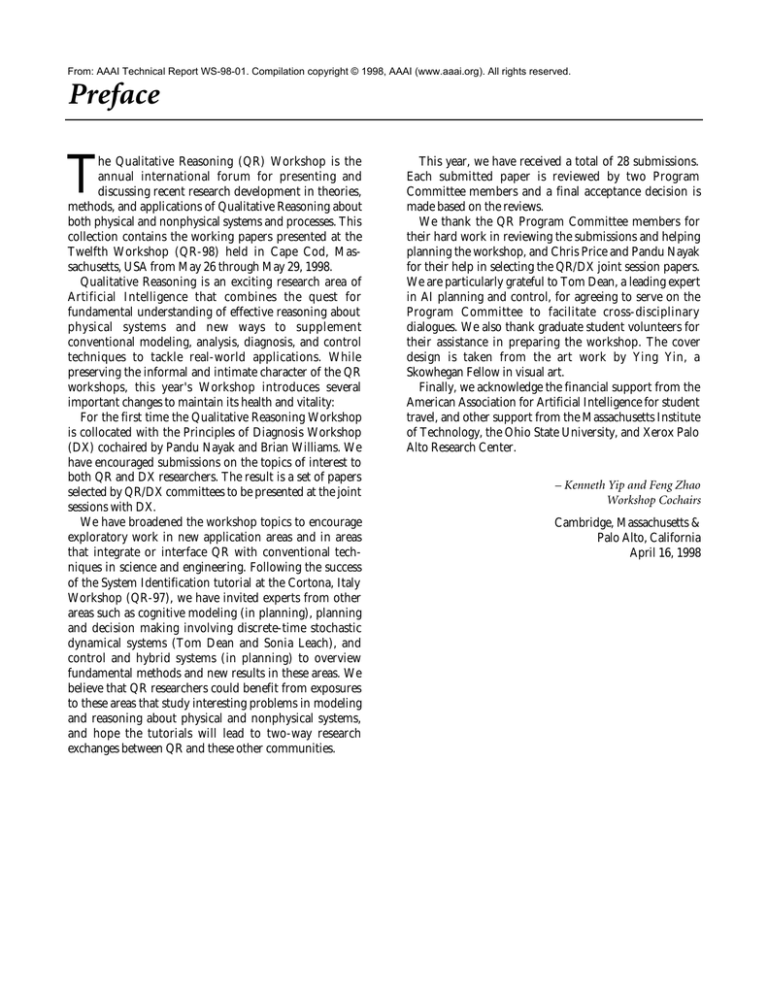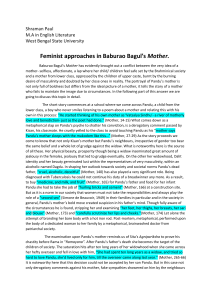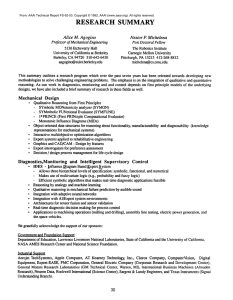
From: AAAI Technical Report WS-98-01. Compilation copyright © 1998, AAAI (www.aaai.org). All rights reserved.
Preface
T
he Qualitative Reasoning (QR) Workshop is the
annual international forum for presenting and
discussing recent research development in theories,
methods, and applications of Qualitative Reasoning about
both physical and nonphysical systems and processes. This
collection contains the working papers presented at the
Twelfth Workshop (QR-98) held in Cape Cod, Massachusetts, USA from May 26 through May 29, 1998.
Qualitative Reasoning is an exciting research area of
Artificial Intelligence that combines the quest for
fundamental understanding of effective reasoning about
physical systems and new ways to supplement
conventional modeling, analysis, diagnosis, and control
techniques to tackle real-world applications. While
preserving the informal and intimate character of the QR
workshops, this year's Workshop introduces several
important changes to maintain its health and vitality:
For the first time the Qualitative Reasoning Workshop
is collocated with the Principles of Diagnosis Workshop
(DX) cochaired by Pandu Nayak and Brian Williams. We
have encouraged submissions on the topics of interest to
both QR and DX researchers. The result is a set of papers
selected by QR/DX committees to be presented at the joint
sessions with DX.
We have broadened the workshop topics to encourage
exploratory work in new application areas and in areas
that integrate or interface QR with conventional techniques in science and engineering. Following the success
of the System Identification tutorial at the Cortona, Italy
Workshop (QR-97), we have invited experts from other
areas such as cognitive modeling (in planning), planning
and decision making involving discrete-time stochastic
dynamical systems (Tom Dean and Sonia Leach), and
control and hybrid systems (in planning) to overview
fundamental methods and new results in these areas. We
believe that QR researchers could benefit from exposures
to these areas that study interesting problems in modeling
and reasoning about physical and nonphysical systems,
and hope the tutorials will lead to two-way research
exchanges between QR and these other communities.
This year, we have received a total of 28 submissions.
Each submitted paper is reviewed by two Program
Committee members and a final acceptance decision is
made based on the reviews.
We thank the QR Program Committee members for
their hard work in reviewing the submissions and helping
planning the workshop, and Chris Price and Pandu Nayak
for their help in selecting the QR/DX joint session papers.
We are particularly grateful to Tom Dean, a leading expert
in AI planning and control, for agreeing to serve on the
Program Committee to facilitate cross-disciplinary
dialogues. We also thank graduate student volunteers for
their assistance in preparing the workshop. The cover
design is taken from the art work by Ying Yin, a
Skowhegan Fellow in visual art.
Finally, we acknowledge the financial support from the
American Association for Artificial Intelligence for student
travel, and other support from the Massachusetts Institute
of Technology, the Ohio State University, and Xerox Palo
Alto Research Center.
– Kenneth Yip and Feng Zhao
Workshop Cochairs
Cambridge, Massachusetts &
Palo Alto, California
April 16, 1998





